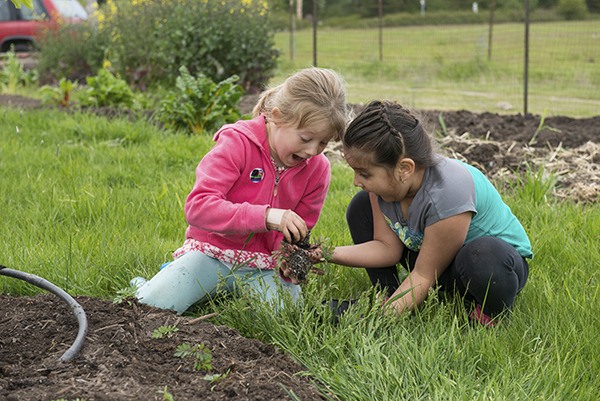The success of the School’s LIFE Garden and Farm Program is spreading to other schools in the region. Last summer Rhea Miller of Lopez Community Land Trust was asked to arrange a tour for visitors from Whidbey Island interested in Lopez school’s LIFE Garden and Farm Program. Little did she know that this visit would result in yet another school garden program. Cary Peterson, chief gardener of Good Cheer Gardens on Whidbey Island, had learned about the program through a Thriving Communities Conference where she heard Rhea speak. Inspired by the program, Cary persuaded Dorit Zingarelli from the Whidbey Island Nourishes backpack program, Bruce Kinney and Dana Daniel, food service directors of the South Whidbey Schools and Monroe School District respectively, and three of her apprentices to join her in visiting Lopez School. The visitors met with Bill Evans, Superintendent, gardeners Suzanne Berry and Valerie Yukluk, and cooks Dana Cotton and Sam Taylor. The visitors returned to South Whidbey Schools and worked toward permitting produce grown on the school grounds to be served in their cafeterias. The challenge was that Chartwells, a food service management company, was on contract for all their cafeteria food.
Lopez just received word that the South Whidbey School District and Chartwells reached agreement on all the liability and garden protocols, and Chartwells served the first school-grown salad greens last month at the Langley Middle School. The agreement is a first for any school in the nation to provide school-grown produce direct to the cafeteria under the protocol of Chartwells, according to the South Whidbey Record. (5/23/14) In just one week, Langley Middle School was able to see increases in salad consumption by the students. Langley middle school was followed by the elementary school and the high school. Under the coordination of Cary Peterson, enough greens are growing in the school gardens to supply the entire South Whidbey School District.
More and more schools are starting to include growing gardens as part of their curriculum.
According to Cornell University’s website, third, fourth, and fifth grade students that participated in school gardening activities scored significantly higher on science achievement tests compared to students that did not experience any garden-based learning activities. (See Klemmer, C.D., Waliczek, T.M. & Zajicek, J.M. (2005). In yet another study, students in a one-year school gardening program increased their overall life skills by 1.5 points. The gardening program positively influenced two constructs: “working with groups” and “self-understanding.” (Robinson, C.W. & Zajicek, J.M. (2005).
Ironically, studies also show that students putting their hands in dirt do better at school. Beneficial bacterium in soil makes us happier. This study discusses a strain of bacterium in soil, Mycobacterium vaccae, that has been found to trigger the release of seratonin, which elevates mood and decreases anxiety. This bacterium has also been found to improve cognitive function. (Lowry C.A., et al. (2011).
On the Lopez home front, the benefits are obvious. The school has little noticeable obesity problem, the consumption of vegetables has increased dramatically, behavior in the lunchroom has improved, and students love grazing in the gardens. Lopez’s school garden program has harvested over 5093 pounds of produce during this school year, valued at our local market prices at $18,311. The hoop houses are full of produce still, much of which will be harvested and processed over the summer by the gardeners and volunteers.
Care of the gardens must continue over the summer to sustain the vegetables that don’t mature until August and September, such as the tomatoes and squashes that supply the delicious tomato sauce for the school year. This summer the program is blessed with the arrival of an intern from Brazil, Alice Mascarenhas Ornellas. Lopez Community Land Trust arranges for interns to work in the LIFE Garden and Farm Program under the supervision of school staff and through the generosity of the Heller family. Care of the garden over the summer will assure the fall harvest of the students’ “Pizza Garden.” Elementary students, inspired by their garden teacher Sarah McCullough, planted a garden bed in the shape of a pizza that contains all the ingredients—from tomatoes, peppers to wheat-for-making pizza. Although the program has already been highlighted nationally in the book Smart by Nature, it is gratifying to see that a simple seed planted in Lopez’s very first gardens is now spreading throughout the region.



